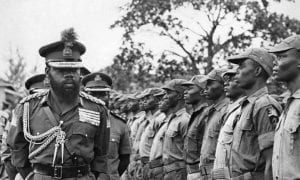Learn more about: The Biafran War
“Ojukwu referred to the massacres of Igbos in 1966 as a ‘genocide’ and the core reason why the Igbos needed their own homeland. In an address to the Organization of African Unity on 5 August 1968, he accused the FMG of waging a ‘genocidal war’ against Biafra, and argued that it was ‘appalling’ that ‘this palpable genocide is being openly financed and directed by major NON-AFRICAN powers whose interest in the event is the economic and political advantage of their own countries’” (251).
In her article, Smith she focuses on British involvement and influence in the Biafran War. More specifically, how the British encouraged Nigeria to create an observer team that would plan genocide in Biafra. She also writes about how British powers supported the Federal Military Government of Nigeria (FMG) to commit genocide by providing funding for military supplies.
(Karen E. Smith (2014) The UK and Genocide in Biafra, Journal of Genocide Research, 16:2-3, 247-262, DOI: 10.1080/14623528.2014.936703.)
Learn more about: African Immigrant Experiences in Literature
In this article, Landry writes about depictions of African immigrant experiences in literature. She focuses specifically on immigration to the United States and how it changes what she refers to as the “Black identity.” She supports her claim by using Adichie and fellow author Yaa Gyasi. Landry argues that African immigrants come to the U.S with “pre-migration ethnic identities” (127) and immediately have to face the very racialized, black and white American society. Consequently, African immigrants have become stripped of their culture while trying to assimilate. These themes of migration, cultural loss, and displacement are present throughout Half of a Yellow Sun.
Ngozi Adichie’s Americanah and Yaa Gyasi’s Homegoing.” Melus, 43:4, 127–147, DOI:10.1093/melus/mly044.
Learn more about: Contemporary Nigerian Literature
This article lists Nigeria’s top ten authors and elaborates on what kind of literature they produce. Jagoe begins with authors from the 1980s and 1990s, then moves chronologically to modern Nigerian Literature. For example, playwright, poet, and fiction writer Femi Osofisan is inspired by the lingering effects of colonialism in Africa. His work is described as a protest to corruption and injustice. Adichie is mentioned in the article as well; Jagoe praises her first two books Purple Hibiscus and Half of a Yellow Sun for accurately depicting the horrors of racism, forced migration, and globalization.
Jagoe, Rebecca. “From Achebe to Adichie: Top Ten Nigerian Authors.”A Culture Trip, 16 July 2013, the culture trip.com/africa/nigeria/articles/from-achebe-to-adichie-top-ten-nigerian-authors/
Kyna Smith 2019




